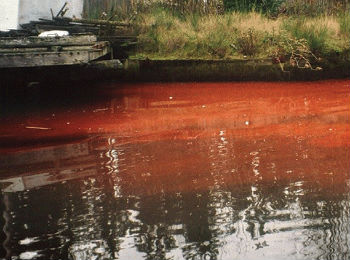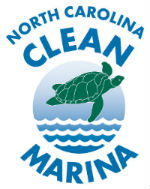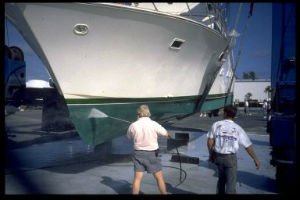First of two parts
 If not properly contained, runoff from power washing boats can pollute the water with the toxic chemicals in anti-fouling bottom paint. If not properly contained, runoff from power washing boats can pollute the water with the toxic chemicals in anti-fouling bottom paint. |
WILMINGTON – In 2010, Specialty Boatworks in Bellville, near Wilmington, became the first business in North Carolina to have its boat power-wash recycling operations permitted by the state as being in full compliance with all environmental rules. Apparently, not many others have followed.
Supporter Spotlight
“I spent a lot of money for a system to meet the rules,” owner-operator Alan Rusher said recently. “I’m happy with the system. It meets the requirements and it works.”
What Rusher is not happy about, almost two years later, is that his business remains at least somewhat an outlier, probably an exception, not the rule. In a state that has for years, with some justification, prided itself on protecting coastal water quality, toxic chemicals, including copper, from boat power-washing operations at many marinas and boatyards still enter streams and sounds.
“I complied with the rules and I don’t see why everybody else shouldn’t, too,” Rusher said.
Lean budgets have forced staff cuts, officials with the N.C. Division of Water Quality say, and legislators want them to be “friendlier” towards the businesses they regulate. They admit, though, that power washing boats is a problem.
“Sometimes you can see the blue paint in the water,” said Jim Gregson, surface water protection supervisor for the state Department of Environment and Natural Resources, or DENR, Wilmington Regional Office, which covers the counties from the South Carolina border north through Carteret. “That isn’t allowed under the federal Clean Water Act. But it happens. And it’s not just copper that is a big concern. There’s also tin.”
Supporter Spotlight
Copper has been the substance of choice for anti-fouling paint on boats for about two centuries. Anti-fouling paint generally works by dissipating metal at the surface of the boat’s hull to either kill organisms – plants and barnacles alike – or to keep them from attaching to the hull in the first place.
Toxic Pollutants
Power washing can wash that copper and other pollutants into waters where the boats are, or, alternately, into the ground. If that water from the washing on the ground is not captured and either recycled or hauled away, it still can make its way to the water, where it’s potentially toxic to larvae and can hinder the development of many marine organisms. The problem can often be magnified because many marina basins are sited and designed specifically to limit wave action, which also limits circulation, concentrating the toxicity.
Mollusks, such as oysters, clams and mussels, are particularly sensitive to heavy metals since they have no means of processing or excreting them. Some of the most detrimental effects of contamination, scientists say, are decreased reproduction and decreased ability to filter water. The latter is doubly important because it affects the shellfishes’ growth and survival – and because filtration is a major factor in keeping waters clean. An adult oyster can filter as much as 50 gallons of water a day. Additionally, metal toxicity in mollusks can easily move up the food chain as the shellfish are eaten.
 Mike Giles Mike Giles |
Mike Giles, the coastal advocate in the Wilmington Regional Office of the N.C. Coastal Federation, said the state needs to take much stronger steps to require marinas and boatyards to control runoff from power-washing operations, so that the copper and other chemicals are collected and either treated onsite or hauled off for treatment and disposal elsewhere. The Clean Water Act requires it, and the state’s general stormwater permit for marinas and boatyards, specifically “does not authorize discharges at the facility containing waste streams including, but not limited to, bilge and ballast water, cooling water, sanitary wastes, power and hand washing, blasting, sanding, and fish cleaning stations.”
But, Giles charged, enforcement is at best lax. “There are rules,” he said. “But without enforcement, the rules accomplish very little.”
Gregson conceded that enforcement is complaint-driven. “When we see something, or when someone else reports to us that they have seen something, we’ll address it and try to help the owner find ways to solve the problem,” he said. “But part of the problem is that there are so many different situations. We do require compliance from new marinas, but it’s difficult for older ones, and a solution that might be available at one place might not be at another.”
Some businesses try to comply by simply channeling boat-washing wastewater to a retention area, where it seeps into the ground or can evaporate. But, Gregson said, that doesn’t comply with the Clean Water Act.
“Our focus, knowing how difficult this (ensuring compliance) is to do, is a lot on education now,” Gregson said.
Clean Marina Program
The N.C. Clean Marina Program does the bulk of that work. It’s a voluntary program that began in the summer of 2000. Marina operators who choose to participate fill out an evaluation form and are given a list of best management practices, or BMPs, to implement. Those that meet criteria developed by the N.C. Marine Trades Association and the state Division of Coastal Management, another agency under the DENR umbrella, are designated as “clean marinas” and get to fly a flag that advertises their designation. They also get to use the “Clean Marina” logo in advertising.
The BMPs are fairly specific. For example, one recommends prohibition of in-water painting of boat hulls and cites a state rule: “Boat maintenance areas shall be designed so that all scraping, sandblasting and painting will be done over dry land with adequate containment devices to prevent entry of waste materials into adjacent waters.”
 |
Another BMP is to “Provide designated work areas as far away as possible from surface waters, storm water systems, ditches or other modes of transport to surface waters. Ensure that work areas are clearly marked, have impermeable surfaces (e.g. concrete or plastic tarps) and that all solid waste is collected and properly disposed of at the end of each workday (or sooner if rain is expected). Nearby storm drains should also be covered until all solid waste is removed to prevent waste from being washed into surface waters.”
The specific BMP for power washing states: “Provide and clearly mark a designated wash down and pressure-washing area with an impermeable surface that does not drain to surface waters or direct wastewater over land and cause infiltration into groundwater. Wash water is considered to be a process wastewater and must be collected and either pretreated and directed to a sanitary sewer, permitted through nondischarge means such as recycling, or hauled off for proper disposal by a licensed contractor. Discharge to a septic system is prohibited.”
Katie Merritt, nutrient offset coordinator and compliant specialist with the DENR main office in Raleigh, agreed most inspections of coastal marinas are now complaint-driven, but said that’s in large part because of staff cuts.
“We used to go out pretty often, but we’ve lost four or five folks because of budget cuts, so right now there is no one specifically assigned to do that,” she said. “But we are required to make a certain number of inspections by the federal government for… compliance, and most of those now take place based on complaints we receive.”
Another change is that the N.C. General Assembly last year issued a directive Merritt said told the agency to be “kinder and gentler,” more user-friendly.
Less Emphasis on Fines
As a result of that, and of the generally poor economic conditions, she said, there is less emphasis now on fines than on efforts to help solve problems by working with businesses to find solutions to violations. The agency, she said, doesn’t want to levy civil assessments that might cause a business to “go under.”
 |
“We’re being more proactive in reaching out to businesses and giving them information on the BMPs … and giving them the names of vendors in the state who have products to help them comply,” she said.
Merritt added that, in part because of the staff reductions, it’s difficult, at best, to know if the kinder, gentler, proactive approach results in more compliance. But, she said, the agency generally does see improvements as a result of working with business owners one-on-one. Most operators, she said, want to do the right thing to protect the waters they depend upon for their livelihoods. But there is less of that crucial one-to-one contact since the staff reductions.
Merritt stressed that DENR, despite the staff cuts and other issues, still takes the issue of power washinng very seriously.
Pat Durrett, who heads the Clean Marina Program from the N.C. Division of Coastal Management’s main office in Morehead City, is only a part-time employee, a fact some point to as an indicator of a lack of emphasis on the problem.
There are only about 22 designated “clean marinas,” according to the program’s website.
Durrett said her program organizes conferences and other educational opportunities that sometimes specifically address power-washing issues. But like Gregson, she agreed that if you visit marinas, especially older ones, you likely will see violations, or evidence of violations, at some.”
“I’m sure there are instances where some follow the rules if we’re out there, but might be less likely to do so when we’re not there,” she said. “It’s like if you are driving on the highway and there’s a highway patrolman behind you.”
Durrett also conceded that even those marinas and boatyards that “have their ducks in a row” and voluntarily follow the BMPs don’t necessarily comply with federal Clean Water Act standards for power washing.
The state, she said, does not routinely test for compliance, and without that, “you don’t always know what’s there, what’s getting into the water.”
Giles, the coastal federation advocate, said he’s been told by those in the know that some marina operators will say privately that they are not going to go to the expense and effort necessary to comply with the letter of federal and state laws and rules on power washing unless the state Division of Water Quality forces them to do so. But one person involved in the issue, he said, has speculated that all it would take to begin a “compliance domino” would be one major enforcement action against one violator.
Wednesday: Some possible solutions







